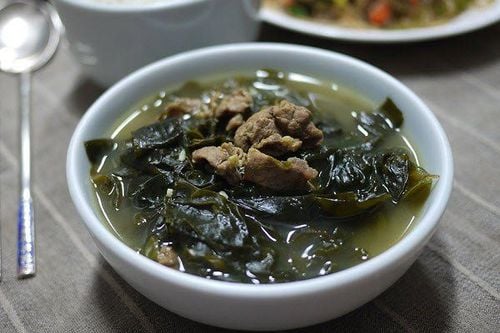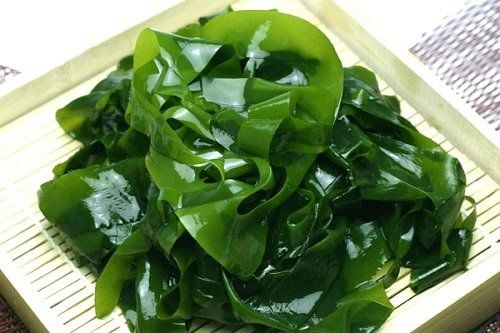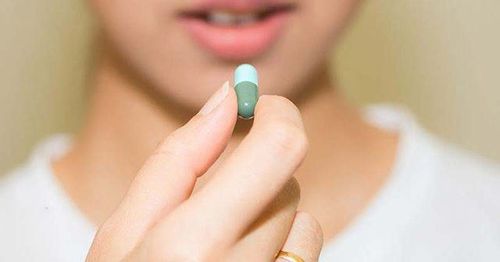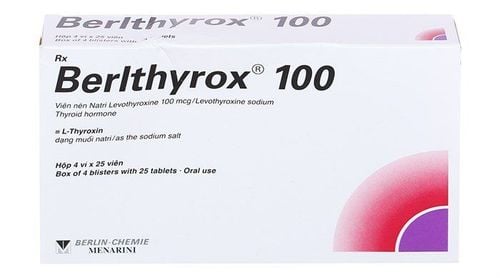This is an automatically translated article.
Seaweed is a common ingredient in Asian cuisine and is quickly gaining popularity among Westerners because of its health benefits. Eating seaweed is one way to add more vitamins and minerals to a healthy and nutritious diet. Regularly eating seaweed can protect you from a number of diseases.1. What is seaweed?
Seaweed is a general term used to describe many different species of algae and marine plants. It can grow in many bodies of water including seas, lakes, and rivers. Algae from the sea are usually edible, while freshwater varieties tend to be toxic. Edible seaweed is classified by color. The most commonly eaten varieties are red, green, blue and brown. Seaweed plays an important role in marine life and is a major source of food for a wide variety of organisms in the ocean.2. Nutrient content in seaweed
Seaweed is rich in minerals and trace elements. In fact, it often contains higher levels of these nutrients than most other foods. The nutritional content of seaweed can vary based on where it grows. Therefore, different types will contain different amounts of nutrients. Every 100 grams of seaweed will include the following nutrients:Carbs: 10 grams Protein: 2 grams Fat: 1 gram Optical fiber: 35% RDI Magnesium: 180% RDI Vitamin K: 80% RDI Manganese: 70 % RDI Iodine: 65% RDI Sodium: 70% RDI Calcium: 60% RDI Folate: 50% RDI Potassium: 45% RDI Iron: 20% RDI Small amounts of other nutrients: omega-3 and omega-6 fatty acids , vitamins A, C, E, phosphorus, B vitamins and choline. Seaweed is a rich source of antioxidants. It also contains high amounts of sulfated polysaccharides (sPS), which are beneficial plant compounds believed to contribute to health benefits.

Rong biển rất giàu khoáng chất và các nguyên tố vi lượng
3. Seaweed May Help Promote Thyroid Function
The thyroid gland plays a number of important roles in the body, helping to regulate metabolism. The thyroid gland needs a good amount of iodine to function properly. And in most seaweeds there is iodine. Iodine is found in seafood, dairy products and iodized salt. Insufficient dietary iodine can lead to hypothyroidism. The standard iodine intake for adults is 150 micrograms per day. Most people can meet this requirement by eating seaweed several times a week. Some like kelp, kombu and dulse tend to contain very high amounts of iodine and should not be eaten often, or in high amounts.4. Seaweed improves heart health
Seaweed contains a number of beneficial nutrients that help keep the heart healthy. It also contains soluble fiber and contains long-chain omega-3 fatty acids, both of which may benefit heart health. They may also help lower LDL ("bad") cholesterol levels and total cholesterol. A two-month study in type 2 diabetics supplemented with spirulina or a placebo every day. In another study, a daily spirulina supplement reduced participants' total cholesterol by 166% more than a placebo group over a two-month study period.5. Helps stabilize blood sugar
Adding seaweed to the diet may reduce the risk of diabetes. Researchers believe that certain compounds found in seaweed may play an important role in stabilizing blood sugar levels and preventing type 2 diabetes. One of these is fucoxanthin, a substance Antioxidants give brown algae its characteristic color. This compound is thought to help reduce insulin resistance and stabilize blood sugar levels. In addition, the type of fiber found in seaweed can slow the rate at which carbs are absorbed from a meal. This can make it easier for your body to stabilize blood sugar.6. Seaweed can help you lose weight

Ăn rong biển thường xuyên có thể giúp giảm cân
Furthermore, seaweed is low in calories, but rich in glutamate, an amino acid believed to give its delicious umami flavor, so it's used as a low-calorie, alternative snack.
7. Seaweed can boost the immune system
Seaweed may also help protect you from certain types of infections. Because seaweed contains marine plant compounds that are believed to have antioxidant, anti-allergic, and disease-protective properties. Research shows that these compounds may have the ability to fight viruses by blocking their entry into cells.8. Seaweed can improve gut health
Seaweed can help improve gut health in a variety of ways. It is rich in fiber, which can help prevent constipation and ensure smooth digestion. It also contains agar, carrageenan and fucoidans, which are thought to act as prebiotics. Prebiotics are a type of non-digestible fiber that feeds beneficial bacteria in the gut. The more good bacteria there is in the gut, the less space there is for bad bacteria to grow.Researchers also believe that prebiotics found in seaweed have certain anti-inflammatory and antibacterial effects. This may be in part because, when you eat a prebiotic, the bacteria in your gut produce butyrate. In addition, some prebiotics may be able to prevent harmful bacteria such as H. pylori from attaching to the intestinal wall.
9. Seaweed may reduce the risk of cancer
The presence of seaweed in your diet may help reduce the risk of developing certain types of cancer. Researchers believe that seaweed may help lower estrogen levels, potentially reducing a woman's risk of developing breast cancer. The soluble fiber found in seaweed may also help protect against the development of colon cancer. What's more, some research suggests that a compound found in brown varieties such as kelp, wakame, and kombu, may help prevent the spread of cancer cells.10. Notes when eating and processing seaweed

Khi sử dụng rong biển quá nhiều có thể gây nguy cơ dư thừa Iốt
10.1 Excess Iodine Seaweed contains a very large and potentially dangerous amount of iodine. In Asian cultures, seaweed is often eaten along with foods that can inhibit the absorption of iodine by the thyroid gland. These foods are found in foods like broccoli, cabbage, and bok choy.
Also, it's important to note that seaweed is water-soluble, so cooking and processing with water can affect its iodine content. For example, when kelp is boiled for 15 minutes, it can lose up to 90% of its iodine content. However, consuming large amounts of seaweed can affect thyroid function and the symptoms of too much iodine are often the same as the symptoms of iodine deficiency
10.2 High in heavy metals Seaweed has can absorb and store minerals in concentrated amounts. This is not good for health, as seaweed can also contain large amounts of toxic heavy metals such as cadmium, mercury and lead. If seaweed is consumed regularly, there is a possibility that heavy metals accumulate in the body over time. You should buy organic seaweed, as it is less likely to contain significant amounts of heavy metals.
To know if your body has iodine deficiency or not, you should have a regular health check-up to make adjustments in your diet and lifestyle. Currently, Vinmec International General Hospital has general health checkup packages suitable for each age, gender and individual needs of customers with a reasonable price policy, including:
Health checkup package diamond general health check-up package Vip special health check-up package Comprehensive general health check-up package Standard general health check-up package Patient's examination results will be returned to your home. After receiving the results of the general health examination, if you detect diseases that require intensive examination and treatment, you can use services from other specialties at the Hospital with quality treatment and services. outstanding customer service.
Please dial HOTLINE for more information or register for an appointment HERE. Download MyVinmec app to make appointments faster and to manage your bookings easily.
Reference source: healthline.com












